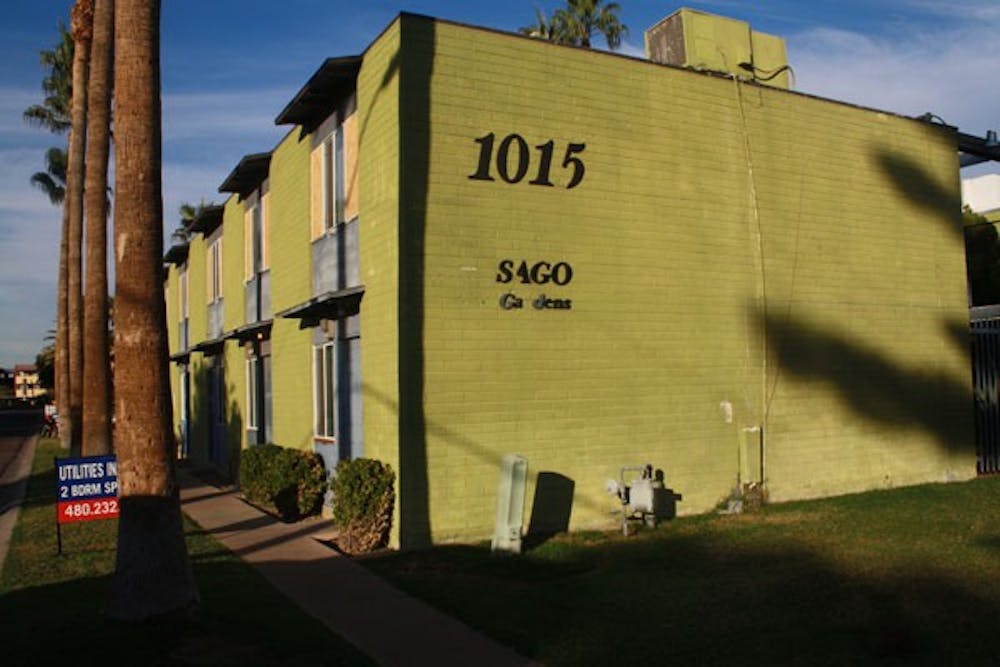 Police are reopening a murder case that happened 15 years ago in apartment nine at Sago Gardens. (Photo by Hector Salas Almeida)
Police are reopening a murder case that happened 15 years ago in apartment nine at Sago Gardens. (Photo by Hector Salas Almeida)Tempe Police cold case detectives are re-examining the rape and murder of an ASU student in hopes of unearthing evidence that could lead to the arrest of a killer who has eluded them for more than 15 years.
Detective Tom Magazzeni said the unsolved murder case of Fiona Yu, a 21-year-old business senior who was killed in her apartment in 1997, is being re-opened because he believes there is potential to identify a suspect or suspects.
“I believe the answers are out there, and hopefully I will be able to find them because we owe it to the victim and her family, not just as police or detectives, but as a community,” he said.
On the evening of Aug. 4,1997, Yu’s roommate Kazu Ito came home and found her roommate raped, strangled and left for dead on the second floor of their apartment near Terrace Road and Lemon Street.
“My roommate is on the floor … I called her name and she is not waking up,” Ito told a police dispatcher in an emotional 911 call. “Her mouth is blue and she is not breathing.”
Magazzeni, an ASU alumnus, was just beginning his career in homicide when Yu was killed and he assisted on the original case.
“It made me sick that a person who had so much going for her could be so viciously attacked and murdered in the same neighborhood that I lived in when I went to ASU,” he said.
Lead homicide detective Larry Baggs said the murderer probably knew Yu and might still have been in the apartment when Ito arrived.
Yu’s murder is Baggs’s only unsolved case in his 12 years as a homicide detective.
“It would mean a lot to me if we could bring closure to her family,” he said. “For them to know what happened that night is a huge part of the healing process.”
Baggs said detectives obtained a good sample of DNA from the crime scene but have yet to find a match in the FBI’s national DNA criminal database.
“It just weighs on you more and more as time goes on,” he said. “You do everything you can and you ask yourself why something hasn’t surfaced.”
Maricopa County senior public defender Andrew Clemency said college students are usually not very careful or aware of potential dangers.
“Most students have not been around the block enough times to understand how dangerous the world can be, which makes them easy targets for rapists and murderers and other violent people,” he said.
Clemency, a criminology professor who has extensive experience in litigating cold cases, said they are usually reopened because detectives have matched DNA from their crime scene.
Baggs said detectives investigated two Tempe teenagers who were charged with a September 1997 rape and attempted murder of another ASU student, but DNA tests came back negative.
Janne Gaub, executive officer of the Criminology and Criminal Justice Graduate Student Association, said cold cases are difficult to solve because biological evidence is hard to preserve and witness’ memories can fade.
However, the second-year criminology and criminal justice doctoral student said the passing of time also has its benefits.
“In many cold cases, the case is solved by the perpetrator telling someone in the 10-plus years since the event happened, because he or she felt safe,” she said in an email. “In others, a girlfriend/boyfriend might come forward with information or change their story because of a break up or other change in relationship with the perpetrator.”
Father Nathan Castle was the priest at ASU’s All Saints Catholic Newman Center in 1997. He administered the funerary rights for Yu.
“It was shocking and awful and really troubling because no one knew if it was a random act or if it was somebody that she knew,” he said.
Castle, who now works at Stanford, said he has been a campus minister for more than 23 years and has dealt with sudden accidental deaths and even student suicides.
Yu’s is the only funeral he has presided over for a student who was murdered.
“As a parent, the worst news you could get is that your daughter has been murdered in her own apartment,” he said. “I told her family and friends to take a deep breath and look away from the murder and think of the good memories they had of her.”
Any information about Yu’s death should be reported to police by calling the non-emergency line at (480) 350-8311 or Silent Witness at 480-948-6377.
Reach the reporter at npmendo@asu.edu




